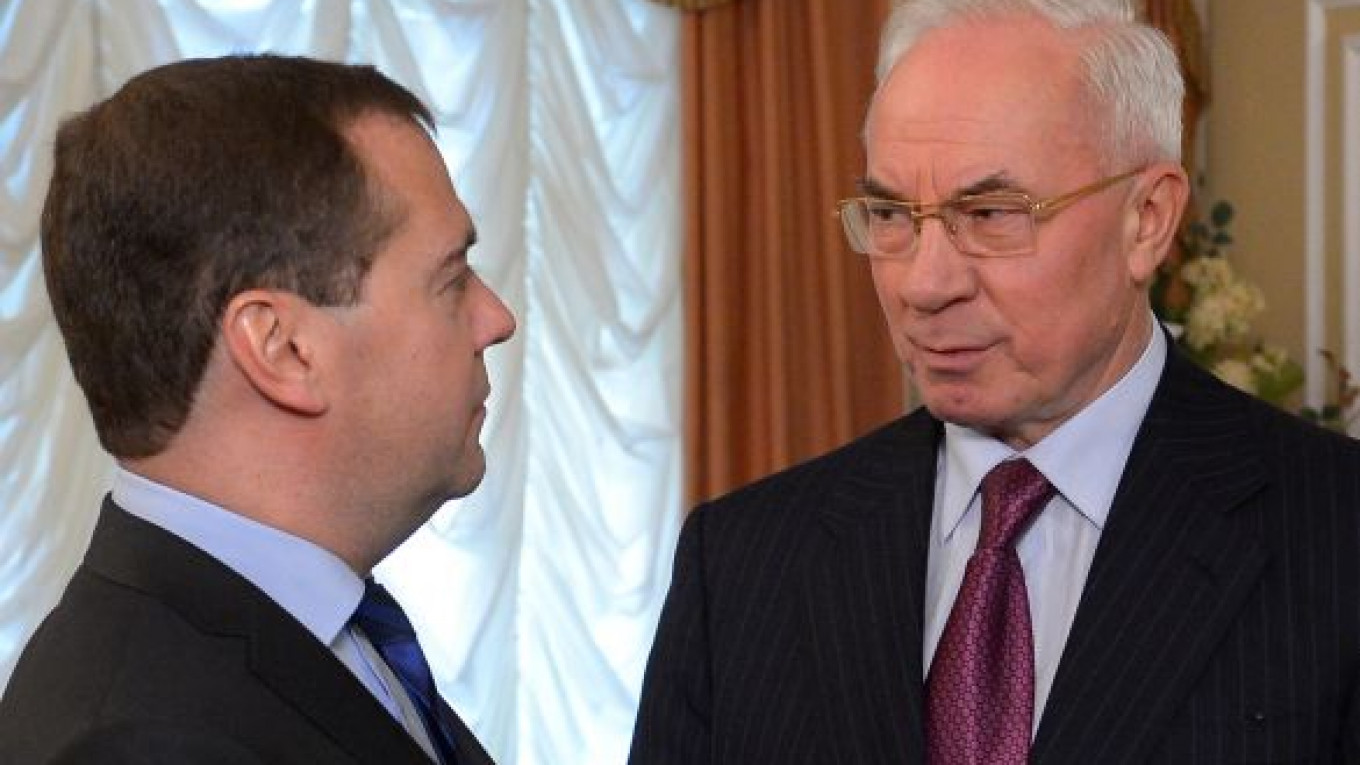KIEV — Ukraine, struggling with a weak economy, is considering shelving plans to cut corporate tax and VAT next year to prevent further pressure on its deteriorating public finances, its chief tax minister said.
Under tax legislation mapped out in 2010, the former Soviet republic was set to reduce corporate income tax to 16 percent, from 19 percent, and reduce the value-added tax rate to 17 percent, from 20 percent.
The two taxes typically account for about two-thirds of Ukraine's total state budget revenue. Revenue and Duties Minister Oleksandr Klymenko said the International Monetary Fund, Kiev's main international lender, had backed putting the tax cuts on hold given the deteriorating economy.
"We are now in discussion on this issue," Klymenko said in an interview in which he outlined the government's plans to boost public revenues by plugging tax loopholes and aligning Ukraine's taxation system with European standards.
"If we leave [the legislation] unchanged, we will not be able to avoid a decrease in the amount of income from these sources … of about 25 billion hryvna ($3.1 billion)," he said, clearly suggesting that authorities might now postpone the planned reductions.
The expected loss would be the equivalent of about 7 percent of this year's total budget revenue.
Klymenko said the government had discussed shelving the plan with Ukrainian business associations as well as the IMF.
"[The IMF experts] say it would be difficult for Ukraine to cut tax rates," Klymenko said.
Kiev has been under scrutiny by ratings agencies on fears it could default on its debt. The IMF froze a $15 billion program with Ukraine in 2011 after the government reneged on pledges to raise the price of domestic gas.
The World Bank cut its 2013 growth forecast for the country to zero last week. Yet Ukraine's state budget assumes 3.4 percent economic growth this year.
The export-oriented economy, dominated by steel production, dipped into recession in the second half of 2012 due to declining global demand for metals, and it continued to contract in the first half of this year.
Budget revenue declined 1.3 percent year on year in January to August, with income from VAT falling by 2.5 percent and corporate profits tax revenue down 1.1 percent, according to finance ministry data.
At the same time, budget expenditure — which covers sectors such as civil service pay, state infrastructure and utilities, and social benefits — rose by 7.7 percent while the deficit widened by twice as much over the same period to 34.7 billion hryvna from 16.6 billion hryvna in 2012.
The government does not intend to cut spending but has struggled to honor President Viktor Yanukovych's commitment to improve living standards.
Despite the weak economy and pressure on state revenues, analysts expect the government to increase social spending on pay and benefits next year to improve Yanukovych's standing ahead of a presidential election in early 2015 when he is expected to bid for a second term.
Klymenko also highlighted reforms that he said would bring Ukraine's taxation system more in line with European standards.
This is in keeping with Ukraine's bid to seek closer links with Europe, highlighted by a landmark free-trade pact and a political association agreement Kiev plans to sign with the European Union next month, which have angered Russia.
Kiev is also cracking down on tax avoidance.
It expects a new tax law introduced last month targeting businesses sheltering income at operations abroad to bring in about 20 billion hryvna ($2.5 billion) over the next three years.
It also banned cash payments of more than 150,000 hryvna ($18,750) from last month to better control the property and car markets, where previously people often understated the value of deals to reduce tax. Now payments can be made only via a bank account.
"Pulling the economy out of the shadows is the path we are going to go along," Klymenko said.
A Message from The Moscow Times:
Dear readers,
We are facing unprecedented challenges. Russia's Prosecutor General's Office has designated The Moscow Times as an "undesirable" organization, criminalizing our work and putting our staff at risk of prosecution. This follows our earlier unjust labeling as a "foreign agent."
These actions are direct attempts to silence independent journalism in Russia. The authorities claim our work "discredits the decisions of the Russian leadership." We see things differently: we strive to provide accurate, unbiased reporting on Russia.
We, the journalists of The Moscow Times, refuse to be silenced. But to continue our work, we need your help.
Your support, no matter how small, makes a world of difference. If you can, please support us monthly starting from just $2. It's quick to set up, and every contribution makes a significant impact.
By supporting The Moscow Times, you're defending open, independent journalism in the face of repression. Thank you for standing with us.
Remind me later.






